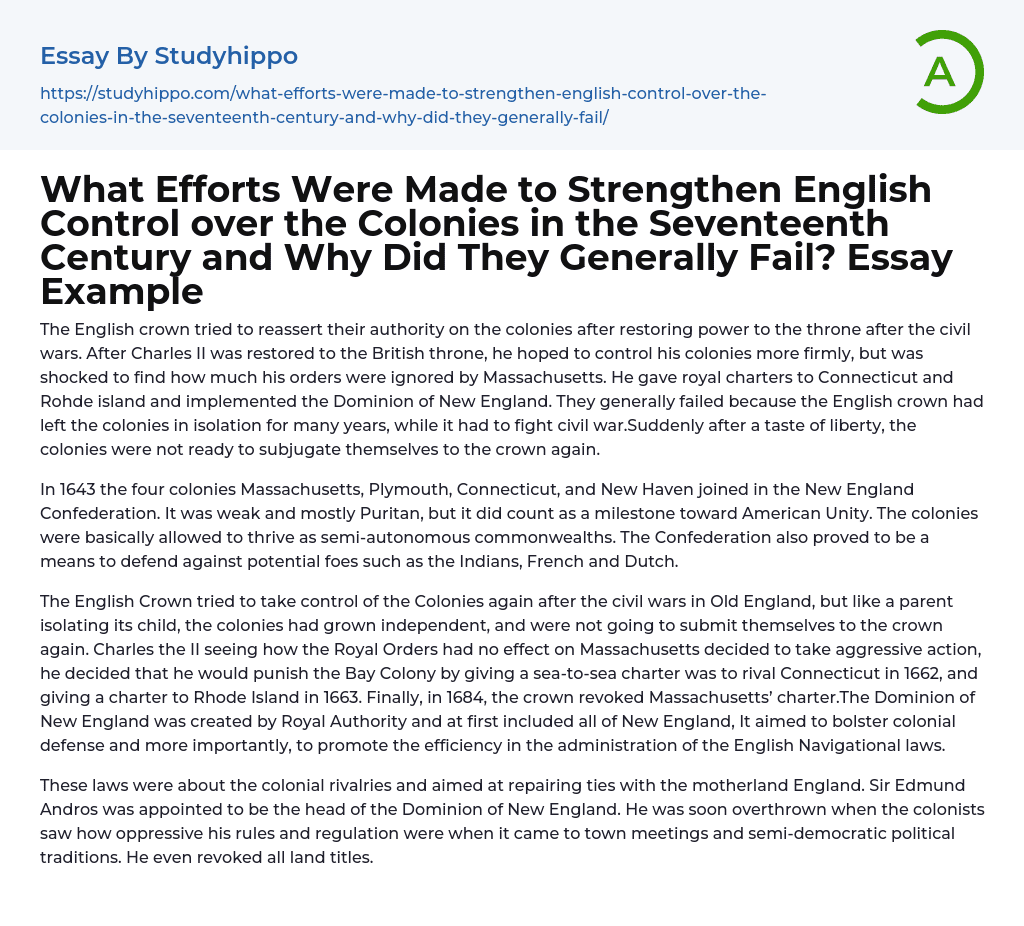The English crown tried to reassert their authority on the colonies after restoring power to the throne after the civil wars. After Charles II was restored to the British throne, he hoped to control his colonies more firmly, but was shocked to find how much his orders were ignored by Massachusetts. He gave royal charters to Connecticut and Rohde island and implemented the Dominion of New England. They generally failed because the English crown had left the colonies in isolation for many years, while it had to fight civil war.Suddenly after a taste of liberty, the colonies were not ready to subjugate themselves to the crown again.
In 1643 the four colonies Massachusetts, Plymouth, Connecticut, and New Haven joined in the New England Confederation. It was weak and mostly Puritan, but it did count as a milestone toward Am
...erican Unity. The colonies were basically allowed to thrive as semi-autonomous commonwealths. The Confederation also proved to be a means to defend against potential foes such as the Indians, French and Dutch.
The English Crown tried to take control of the Colonies again after the civil wars in Old England, but like a parent isolating its child, the colonies had grown independent, and were not going to submit themselves to the crown again. Charles the II seeing how the Royal Orders had no effect on Massachusetts decided to take aggressive action, he decided that he would punish the Bay Colony by giving a sea-to-sea charter was to rival Connecticut in 1662, and giving a charter to Rhode Island in 1663. Finally, in 1684, the crown revoked Massachusetts’ charter.The Dominion of New England was created by Royal Authority and
at first included all of New England, It aimed to bolster colonial defense and more importantly, to promote the efficiency in the administration of the English Navigational laws.
These laws were about the colonial rivalries and aimed at repairing ties with the motherland England. Sir Edmund Andros was appointed to be the head of the Dominion of New England. He was soon overthrown when the colonists saw how oppressive his rules and regulation were when it came to town meetings and semi-democratic political traditions. He even revoked all land titles.
- Federal government essays
- Armed Forces essays
- Confederate States Of America essays
- Federal Government Of The United States essays
- Fourteenth Amendment To The United States Constitution essays
- Governance essays
- Parliament essays
- Politics essays
- Jurisdiction essays
- Bureaucracy essays
- Separation Of Powers essays
- Congress essays
- President essays
- United States Congress essays
- Non-Commissioned Officer essays
- Appeal essays
- Revenge essays
- Corporate Governance essays
- Public Service essays
- Income Tax essays
- Supply essays
- Red Cross essays
- Democracy essays
- State essays
- Liberty essays
- Absolutism essays
- Reform essays
- Republic essays
- John Marshall essays
- Bourgeoisie essays
- Developed Country essays
- Elections essays
- International Relations essays
- Left-Wing Politics essays
- Monarchy essays
- Political Corruption essays
- Political Party essays
- Political Science essays
- Sovereign State essays
- United Nations essays
- World Trade Organization essays
- Contras essays
- Dictatorship essays
- Foreign policy essays
- Monarch essays
- Corruption essays
- Foreign essays
- Democratic Party essays
- European Union essays
- President Of The United States essays




